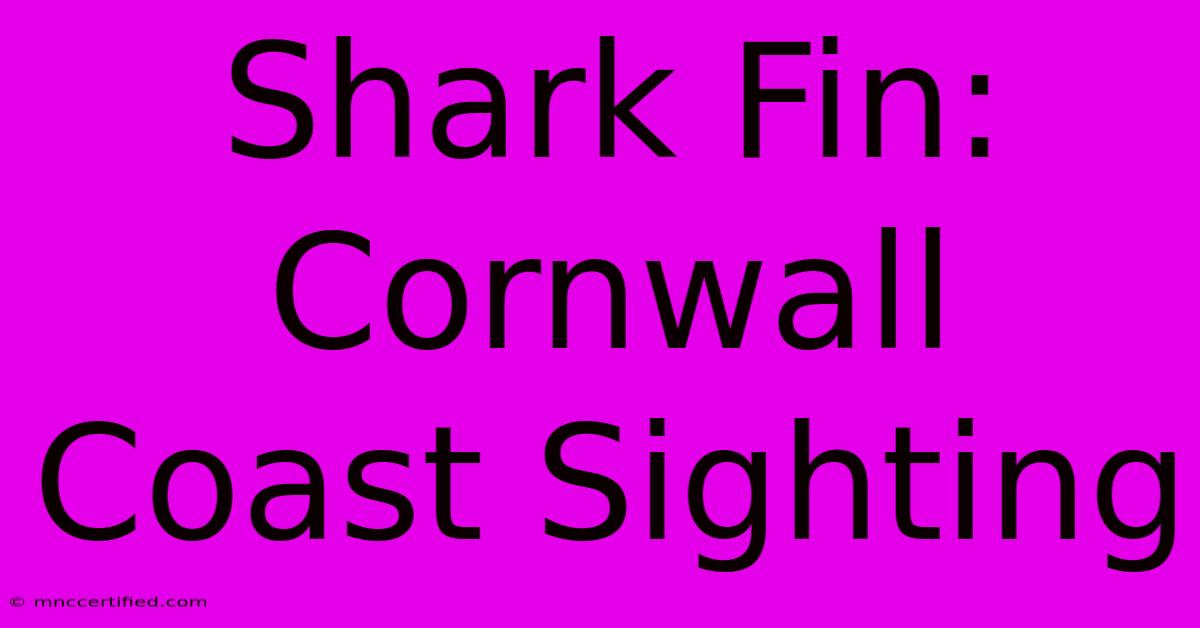Shark Fin: Cornwall Coast Sighting

Table of Contents
Shark Fin: Cornwall Coast Sighting - A Recent Analysis
The recent sighting of a shark fin off the Cornwall coast has sent ripples of excitement (and perhaps a touch of fear!) through the region and beyond. While shark sightings are relatively uncommon in Cornish waters, this event highlights the fascinating marine biodiversity surrounding the UK and the importance of responsible reporting and understanding of these magnificent creatures. This article will delve into the details of the recent sighting, explore the types of sharks potentially involved, and discuss the broader implications for marine conservation.
Details of the Cornwall Shark Fin Sighting
The specific details of the most recent sighting—date, exact location, and photographic or video evidence—are crucial for accurate identification and analysis. Unfortunately, much of the information circulating online relies on anecdotal evidence. Reliable reporting, including details from witnesses and any supporting visual documentation, are essential for verifying the claims. Credible news sources are vital for accurate information. Avoid unverified social media posts that may exaggerate or misrepresent the events.
What kind of shark?
Determining the species of shark from a fin sighting alone can be challenging. Several shark species inhabit the waters around Cornwall, including:
- Basking Sharks: These gentle giants are the most likely candidates for many sightings. They are filter feeders and pose no threat to humans. Their enormous size and distinctive dorsal fin make them easily identifiable.
- Porbeagle Sharks: A smaller, more streamlined shark, the Porbeagle is a powerful predator, but attacks on humans are extremely rare.
- Blue Sharks: Pelagic sharks that migrate through the area, they are less common in coastal waters than the others.
Without clear photographic evidence, it's impossible to definitively identify the species involved in the recent sighting. Submitting high-quality images or videos to marine wildlife experts is crucial for accurate species identification.
The Importance of Responsible Reporting
Accurate and responsible reporting of shark sightings is essential for several reasons:
- Conservation Efforts: Reliable data contributes to understanding shark populations, migration patterns, and overall health.
- Public Safety: While shark attacks are incredibly rare, accurate information can help manage potential risks. Fear-mongering based on inaccurate reports is counterproductive.
- Scientific Research: Detailed accounts, including location, time, and any other observable details, are invaluable for scientific studies on shark behavior and distribution.
Avoiding Misinformation
Misinformation, often spread through social media, can create unnecessary fear and panic. Always verify information from reliable sources before sharing it. Checking the credibility of the news outlet is a critical step in responsible information sharing.
The Broader Context: Marine Conservation in Cornwall
The Cornwall coast boasts a rich and diverse marine ecosystem. Protecting this environment requires a concerted effort encompassing several key areas:
- Sustainable Fishing Practices: Overfishing can disrupt the delicate balance of the marine ecosystem, impacting shark populations and other species.
- Habitat Protection: Protecting vital habitats like seagrass beds and kelp forests is essential for maintaining biodiversity.
- Marine Protected Areas: Establishing and enforcing marine protected areas helps safeguard vulnerable species and their habitats.
- Public Awareness: Educating the public about the importance of marine conservation and responsible interaction with wildlife is crucial.
Conclusion: A Call for Responsible Observation and Conservation
Shark sightings off the Cornwall coast, while infrequent, remind us of the incredible biodiversity in our oceans. Responsible reporting, combined with a commitment to marine conservation, is vital for protecting these magnificent creatures and the delicate ecosystems they inhabit. Let's work together to ensure the future of Cornwall's remarkable marine life. Remember to consult reputable sources and contribute to responsible reporting whenever you encounter a marine wildlife sighting.

Thank you for visiting our website wich cover about Shark Fin: Cornwall Coast Sighting. We hope the information provided has been useful to you. Feel free to contact us if you have any questions or need further assistance. See you next time and dont miss to bookmark.
Featured Posts
-
Bournemouth Vs Brighton Live Stream
Nov 24, 2024
-
Wisconsin Nebraska Tip Off Channel Betting Odds
Nov 24, 2024
-
Galveston Island Home Insurance
Nov 24, 2024
-
Real Madrid Vs Messi December Match
Nov 24, 2024
-
Does Insurance Cover Door Dings
Nov 24, 2024